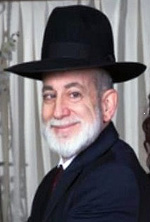By Rabbi Yaakov Marks

SAN DIEGO– The people are about to enter the land. After forty years of wandering and waiting, they have prepared themselves and built a close relationship with G-d. It is now time to enter the land and serve G-d through both the spiritual and physical aspects of man. Before they enter, Moshe relays a message and a warning to them from G-d. “I will bring you into the land that I have sworn about to your forefathers, a land flowing with milk and honey.” (Deuteronomy 31:20) This is the dream of all people, abundance galore and tranquility to pursue your dreams. Moshe continues the message: “You will eat, be satisfied and become fat. You will turn to idols (the prevailing deceptions of that society) and serve them and betray my covenant.” (ibid) This will happen because Moshe relays to them, “I know your inclinations, what you are doing today, even before I bring you to the land Which I have sworn to you.” (Deuteronomy 31:21)
G-d knows the future, but never holds a person accountable for his actions until the deed is actualized. How can G-d rebuke the people for a wrong they haven’t committed? Why would G-d say I know it will happen, it wasn’t done yet? Why does G-d say you will eat, satisfy yourself, get fat, and then rebel? What does it mean today, no bad will be done for years to come?
A person has many plans and goals, thoughts and desires. Many he expresses that he would or would not want to do. Many he says he is or is not doing. However, in his heart and mind, he has reasons and desires that ultimately are what motivates him. No matter how much a person may say he wants to be healthy, if in his mind enjoying food is more important he will eventually give in to his inner desires. If he has a fear that his friends will not like him for being different, he will eventually fail. Rabbi S R Hirsch said on this, “The thoughts, ideas, and wishes that a person of his own free will forms in his mind, which then become the guides of his actions.” In order for a person to change, he must change his inner mindset. He must replace the negative desires with positive ones. He must replace his perceived fears with the truth of reality. Until then he will always end up back to his old ways.
Those people standing by the Jordan river, saying that they wanted to perform G-d’s will were really having inner desires to satisfy themselves with the abundance of pleasure that would be found in the new land.
Inner wishes like this would only lead to disaster. Many times during their forty-year journey in the wilderness when faced with discomfort they complained and sometimes rebelled showing their inner desire for physical pleasure. Not once did they ever try to change or admit that their inner motivation was corrupted. Because of this G-d could say that today I know that your present course of life will bring you to disaster. Your eating is not for positive reasons only to gain pleasure and this behavior can devastate a person. Their inner thoughts will eventually manifest itself in their behavior.
The bounty of our generation presents us with challenges. When a person sits down to Shabbat or Holiday meals with family and friends, they say that they are doing this to honor the day and the people at the table. What is really in their minds? Will they make the focus the day and the people and only eat what is a healthy amount or will they end the meal having over stuffed themselves with an unhealthy amount of tasty food? Their inner intentions will be displayed at the end of the meal.
May we be blessed with wisdom to understand our inner motivations. May G-d grant us the strength to replace our negative desires with positive motivations. May we have the courage to admit our faults and not be afraid to change our behavior outwardly.
*
Rabbi Marks is a life and health coach, who may be contacted via ahealthyrabbi@gmail.com. Comments intended for publication in the space below must be accompanied by the letter-writer’s first and last name and his/her city and state of residence (city and country if outside the U.S.)